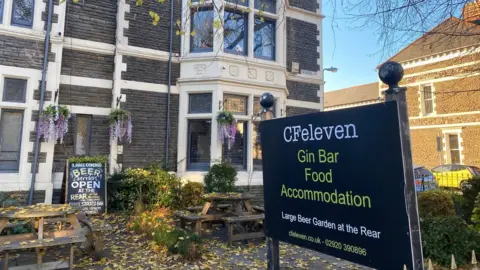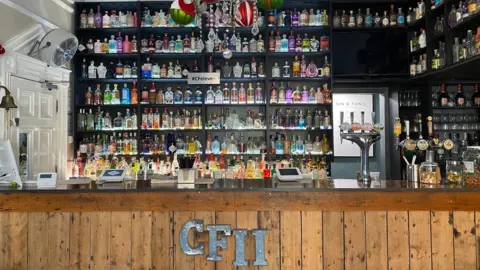Cardiff gin bar closure due to planning clause from 1979
 BBC
BBCA gin bar must close due to a planning condition dating back more than 40 years.
Jason Hamer, owner of CFeleven in Pontcanna, Cardiff, does not have "open to non-residents" permission for his bar.
Mr Hamer said the 1979 planning document means he can only sell alcohol to residents who are staying at his B&B, and not the general public.
Cardiff council said CFeleven was a bed and breakfast, not a public house.
Mr Hamer, 58, said: "We had someone from planning come in and say there's something come to light - you don't have an open to non-residents permission for your bar.
"We went to get the condition removed, first time with planning, and we found out that they hadn't removed it the week before Christmas during Covid."
He appealed against that decision, but has now been given three months' notice to close the bar, which will close in February.
"We asked for longer and they said 'no, three months' notice is reasonable for anybody in hospitality'," he said.
"I thought everything was in order, we hadn't got a clue."
Mr Hamer said he had spent about £16,000 on legal costs.

Mr Hamer said he intends to keep the bar open until February, but does not see a way to just run the bed and breakfast after that.
"Years ago, the B&Bs used to be open all week with contractors and then people on the weekends.
"But in the week you're pretty quiet because in Cardiff there's more than enough hotels in the week, but never enough for internationals with rugby."
Cardiff council said: "Any business owner or developer must check all regulatory aspects relating to their property and its use, and whether it has the required consents in place or not, for the use that it is being used for.
"Licensing applications were received from this business in February 2017 to sell alcohol at the guest house, with revisions put forwards in August 2018 to try to ease some of the conditions that were imposed originally.
"Despite a significant number of objections from local residents, the results of both these applications were favourable to the business owner."
